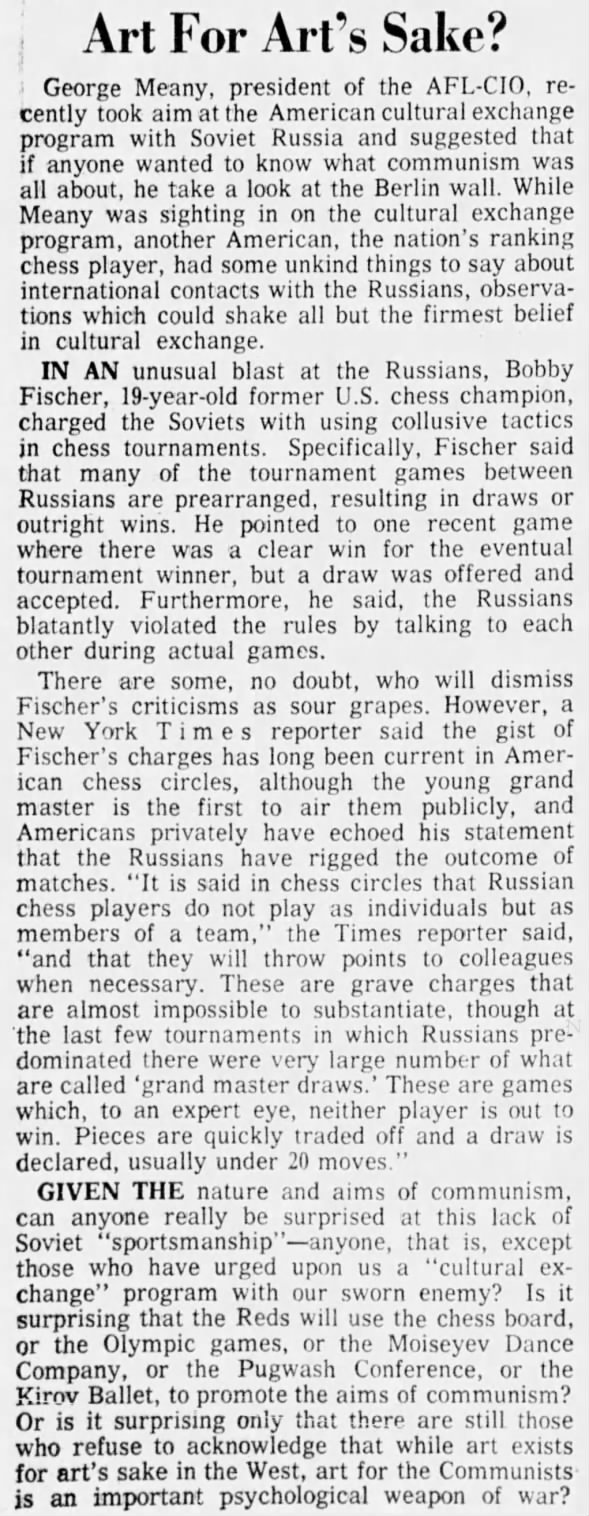Arizona Republic Phoenix, Arizona Monday, September 03, 1962 - Page 6
 Art for Art's Sake? 03 Sep 1962, Mon Arizona Republic (Phoenix, Arizona) Newspapers.com
Art for Art's Sake? 03 Sep 1962, Mon Arizona Republic (Phoenix, Arizona) Newspapers.com
Art For Art's Sake?
George Meany, president of the AFL-CIO, recently took aim at the American cultural exchange program with Soviet Russia and suggested that if anyone wanted to know what communism was all about, he take a look at the Berlin wall. While Meany was sighting in on the cultural exchange program, another American, the nation's ranking chess player, had some unkind things to say about international contacts with the Russians, observations which could shake all but the firmest belief in cultural exchange.
IN AN unusual blast at the Russians, Bobby Fischer, 19-year-old former U.S. chess champion, charged the Soviets with using collusive tactics in chess tournaments. Specifically, Fischer said that many of the tournament games between Russians are prearranged, resulting in draws or outright wins. He pointed to one recent game where there was a clear win for the eventual tournament winner, but a draw was offered and accepted. Furthermore, he said, the Russians blatantly violated the rules by talking to each other during actual games.
There are some, no doubt, who will dismiss Fischer's criticisms as sour grapes. However, a New York Times reporter said the gist of Fischer's charges has long been current in American chess circles, although the young grand master is the first to air them publicly, and Americans privately have echoed his statement that the Russians have rigged the outcome of matches. “It is said in chess circles that Russian chess players do not play as individuals but as members of a team,” the Times reporter said, “and that they will throw points to colleagues when necessary. These are grave charges that are almost impossible to substantiate, though at the last few tournaments in which Russians predominated there were very large number of what are called ‘grand master draws.’ These are games which, to an expert eye, neither player is out to win. Pieces are quickly traded off and a draw is declared, usually under 20 moves.
GIVEN THE nature and aims of communism, can anyone really be surprised at this lack of Soviet “sportsmanship”—anyone, that is, except those who have urged upon us a “cultural exchange” program with our sworn enemy? Is it surprising that the Reds will use the chess board, or the Olympic games, or the Moiseyev Dance Company, or the Pugwash Conference, or the Kirov Ballet, to promote the aims of communism? Or is it surprising only that there are still those who refuse to acknowledge that while art exists for art's sake in the West, art for the Communists is an important psychological weapon of war?






















